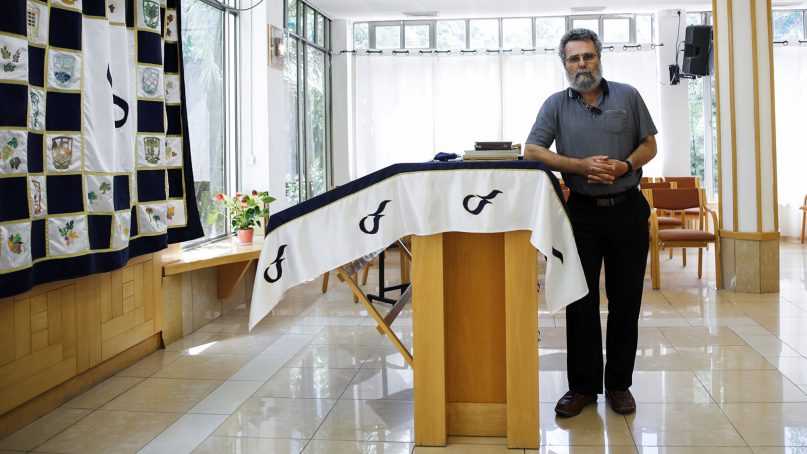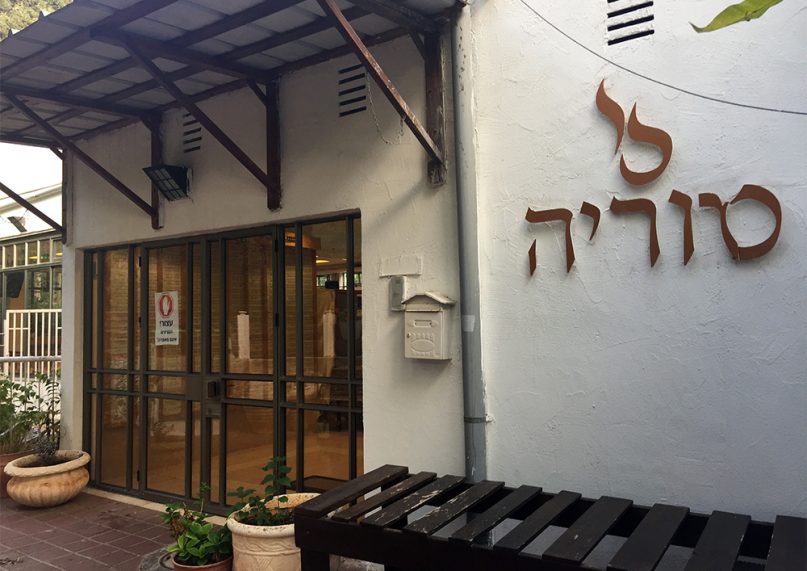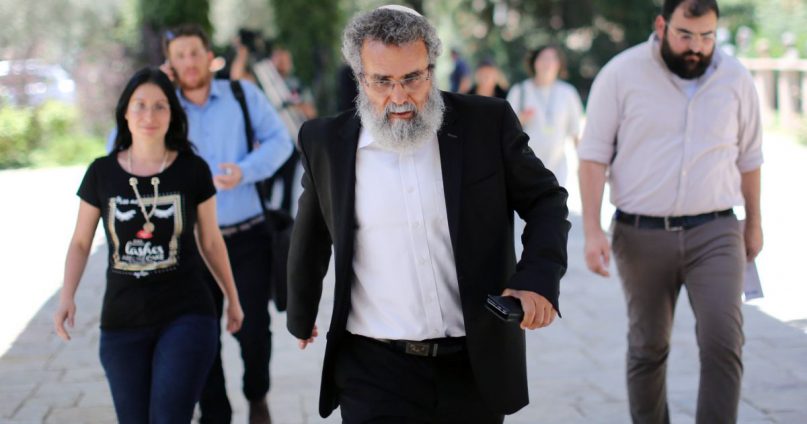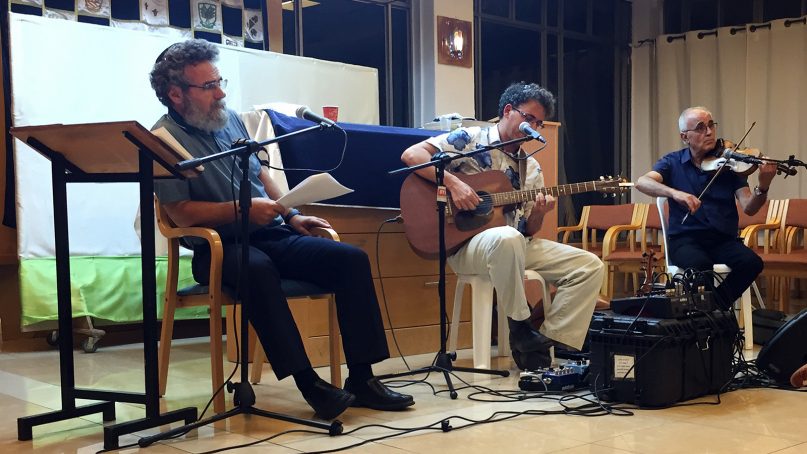HAIFA, Israel (RNS) — Congregation Moriah, this city’s only Conservative synagogue, offers Arabic classes, as well as occasional lessons on the Quran and the Torah led by its rabbi and a local sheikh.
At a recent event Rabbi Dov Hayun recited his poetry, put to music by a Jew playing the guitar and a Christian Arab playing a lute-like instrument called an oud. They riffed on themes of peace, love and finding God while scuba diving.
But its not his habit of collaboration with other faiths that got Hayun in trouble.
At 5:30 a.m. on July 19, Israeli police knocked on the 56-year-old rabbi’s door, threw him into a cruiser and detained him for three hours.
Though never charged, Hayun (sometimes spelled Hayoun or Haiyun) was wanted for questioning after a local rabbinical court filed a complaint about a Jewish wedding he had performed two years earlier.
Israel doesn’t recognize marriages performed by Conservative or Reform rabbis and in 2013, the Knesset passed a law prohibiting Jewish weddings not performed through the Chief Rabbinate, which hews strictly to Orthodox Jewish tradition.
The law cemented the status quo and potentially subjected all rabbis not certified to conduct weddings through the rabbinate with a two-year jail sentence.
But the law had never been enforced, and Hayun’s arrest sparked immediate outrage. While in the police car, the rabbi managed to type a Facebook post on his cellphone, exclaiming, “Iran is here!!!” The post went viral and journalists were waiting outside the police station when he was released.
In the two months since his arrest, Hayun has become a kind of cause celebre for freedom of religion. Hundreds were expected to crowd his small synagogue, located behind a preschool on a major Mount Carmel thoroughfare, for Yom Kippur services. Partly that’s because the Orthodox rabbinate has become so unpopular and partly because of his new claim to fame, buoyed after he entered a race for a seat on the 31-member City Council.

Rabbi Dov Hayun in the synagogue of the Moriah Congregation in Haifa, Israel, on Aug. 1, 2018. Dov Hayun was arrested on July 19, 2018, for conducting Jewish marriages outside of the Chief Rabbinate. Photo by Corinna Kern, courtesy of Dov Hayun
Ironically, perhaps, he is also much in demand to officiate at weddings, which he now does 50 times a year, or nearly once a week.
Hayun’s cause is also giving Israelis reason to atone for their country’s stranglehold on Jewish religious expression. Israel’s Attorney General Avichai Mendelblit has instructed the police to suspend its investigation into Hayun, but the fight to end the Chief Rabbinate’s monopoly continues.
“From one perspective it created a lot of publicity and that’s a good thing because it opened a wound that’s always covered: religious discrimination in Israel,” Hayun said of his arrest. “Israel is one of the only Western countries that doesn’t recognize all its Jews.”
A recent study showed that in 2017 at least 2,434 Jewish couples chose to marry outside the rabbinate’s authority — up 8 percent from the previous year. These couples are choosing a form of civil disobedience, in essence, knowing their unions won’t be formally recognized.
Untold others circumvent the rabbinate by marrying in civil ceremonies abroad (those are usually recognized once the couple returns to Israel and registers as a couple).
“We are very encouraged that more and more Israelis are taking ownership of their Judaism and deciding not to get married via the Chief Rabbinate anymore,” said Yizhar Hess, executive director of the Conservative movement in Israel. “That tells you quite a lot about the potential for change.”
Conservative avant-garde
The Hayun case has also raised the profile of the Conservative movement, born in the United States in the late 19th century, as a sort of middle ground between the more liberal Reform movement and the more stringent Orthodox form of Judaism.
These days, in Israel, the movement has become what Hess called “avant-garde.”
About 2 percent of Israelis consider themselves Conservative Jews, according to a recent Pew study. (Hess put the number at between 200,000 and 300,000.) Though initially led by American ex-pats — half of Conservative synagogues in Israel are English-speaking — the Conservative movement now includes more native Israelis, sometimes referred to as “Masorti,” the Hebrew word for people who keep the tradition but aren’t Orthodox.
Israel now has 80 Conservative synagogues, most of them fairly small since most Israelis aren’t synagogue members, preferring instead to seek out occasional services such as weddings and funerals. “The average Israeli doesn’t need to go to a synagogue to be told he’s Jewish,” said Eitan Kushner, a member of Hayun’s congregation.
But increasingly, the ranks of Conservative Judaism in Israel include natives.
Take Hayun. A Sephardic Jew born in the northern Israeli city of Nahariya, he abandoned the religious ways of his parents as a young man and became secular, like most Israeli Jews.
An educator, he taught middle and high school, led hikes throughout Israel as part of a nonprofit environmental organization and edited a journal of the kibbutz movement. (His wife, Zehavit, is an elementary school principal.)
But religion kept tugging at him. In 2004, he sought a degree from the International Institute for Secular Humanistic Judaism, which ordains secular rabbis. But he soon realized he believed in God and switched to Israel’s Schechter Rabbinical Seminary, which trains Conservative rabbis.
“The Conservative movement appealed to me as a movement of Jewish action and a world of Jewish equality that keeps renewing and evolving,” he said.
After graduating in 2008, he was appointed to his first pulpit at Congregation Moriah. He quickly got to work, marrying couples, celebrating bar mitzvahs and establishing ties with the city’s Christian, Muslim and Baha’i leaders.

The entrance to Congregation Moriah in Haifa, Israel. RNS photo by Yonat Shimron
In a country where religions often make exclusive claims, Hayun believes all religions are equal.
“I don’t like the word coexistence,” he said. “Coexistence means you live in your house and I’ll live in mine and we won’t fight. I want neighborliness. I’ll invite you to my house and you invite me to yours.”
Last year, his synagogue held a Hanukkah menorah lighting ceremony in the courtyard of a Catholic church. On Nov. 24, 2016, when a wave of fires ripped through the city, engulfing part of the synagogue, Muslims and Christians rushed to help clean up and rebuild. (Hayun, a Muslim sheikh and a Maronite Catholic priest received the American Jewish Committee’s Unity Award for their interfaith cooperation after the fire.)
“I believe that when you sow love, you reap love,” he likes to say.
In recognition of his growing stature, the president of Israel, Reuven Rivlin, invited Hayun to his residence on July 19 for an annual Torah study seminar built around the theme of unity.
That same morning, the police knocked on Hayun’s door.
‘They did us a favor’
Two kinds of couples typically ask Hayun to officiate at their weddings: those who won’t marry through the Chief Rabbinate on principle (because they aren’t Orthodox or feel the rabbinate is coercive), and those who are rejected by the rabbinate because they aren’t fully Jewish.
“In most cases, there are halachic solutions to their problems,” Hayun said, citing the Hebrew word for Jewish law. “The Chief Rabbinate is too timid. They’re paralyzing and freezing Judaism.”

Rabbi Dov “Dubi” Hayun of Congregation Moriah, Haifa’s only Conservative Jewish synagogue. Photo courtesy of Dov Hayun
The young couple at the center of the case that led to his arrest came to Hayun after being rejected by the Chief Rabbinate three weeks before their wedding. The rabbinate determined that the bride may be a “mamzer,” a term for a person born of an adulterous relationship. Hayun researched her parentage and determined she was not.
Then, two years after the wedding, the Chief Rabbinate reversed itself and told the couple they were eligible to marry, after all. So they rushed to apply for a marriage license and showed the rabbinical court a video of the wedding officiated by Hayun.
The court then invited Hayun to an interrogation and accused him of illegally officiating at the wedding. He walked out. The rabbinical court filed a complaint with the police and the police then arrested him at his home.
But by invoking the 2013 law, the rabbinical establishment may have inadvertently recognized Hayun’s rabbinical credentials.
“In some ways, they did us a favor,” said Hess. “They proved they do consider Masorti/Conservative rabbis as valid rabbis because otherwise there was no reason to arrest.”
The Conservative movement launched a fundraising campaign shortly after the arrest to press for an end to Orthodox monopoly.
The government, for its part, also recognized the bad optics of the arrest and dropped the matter.
Meanwhile, Hayun’s days are full. He rises at 5:30 a.m. to pray. Then he goes for a run (he’s training for a marathon) before settling into work of the day. He’s rehearsing for another poetry and music event with interfaith musicians, this time at a far larger venue in Tel Aviv.
And he continues to meet with Jewish couples preparing for their weddings. The work is both part of his job and part of his fight for greater freedom of religion.
“This is our struggle,” Hayun said. “But we struggle with love.”





